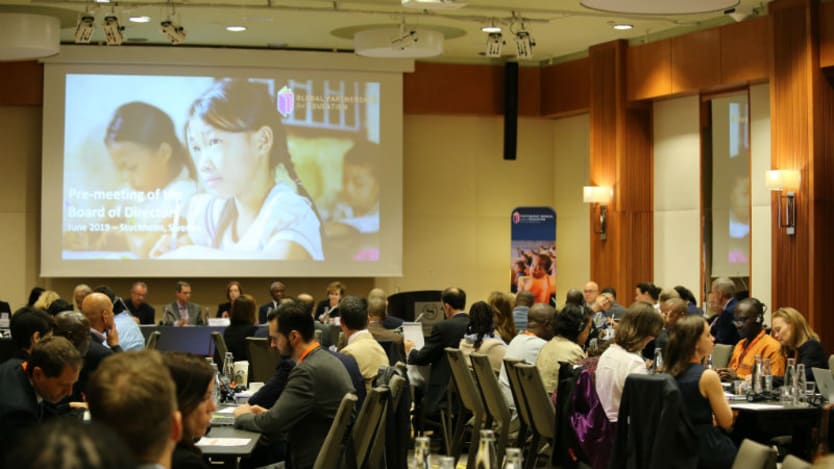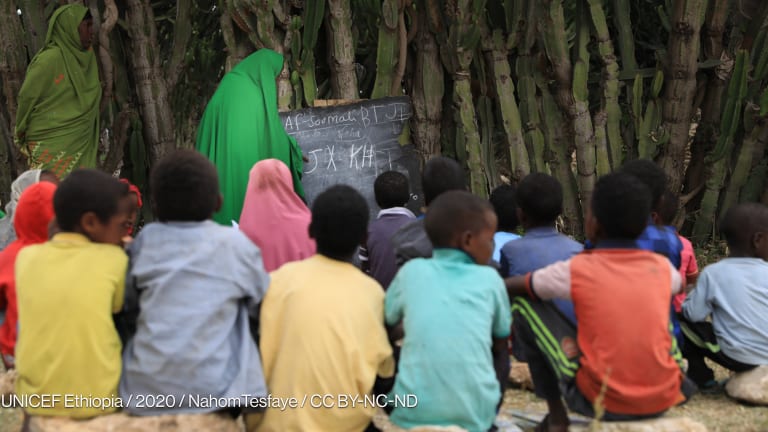
LONDON — Civil society groups are celebrating the Global Partnership for Education’s decision to prohibit its funds from being used to support commercial education actors unless under “exceptional circumstances.”
The decision was reached last Thursday when GPE’s 40-strong board of directors met in Sweden and unanimously adopted a draft private sector strategy that included agreeing that “no GPE funds can be used to support for-profit provision of core education services,” according to a summary document.
“It’s a groundbreaking result where the largest education fund in the world, in complete consensus, has said no to funding any for-profit providers of core education services.”
— Kira Boe, education policy lead, Oxfam International; GPE board memberThe decision marks the end of a two-year battle over how GPE engages with the private sector. Members of the $2.3 billion multidonor education fund, which supports education reform through governments in low-income countries, have clashed over the strategy, especially when it comes to engaging with for-profit education providers.
However, Luis Benveniste, director of the World Bank’s education global practice and member of the GPE board, said the board’s discussion was “rich and amicable,” and that the decision reflected the “maturity of the partnership.”
More on education:
► New principles on the right to public education released
► EU resolution on private schools reignites the battle for global education
► 'Teach' tool not for evaluating teachers, says World Bank education boss
Advocacy groups campaigning against the “commercialization of education,” in particular by for-profit school chains, consider the board decision a victory. They had feared some GPE board members would try to weaken, or even remove the for-profit ban from the strategy — a worry reflected by the fact that United Nations Special Rapporteur on the right to education, Koumbou Boly Barry, intervened and wrote to the GPE board ahead of the meeting urging them to make for-profit actors ineligible for GPE funding.
“It’s a groundbreaking result where the largest education fund in the world, in complete consensus, has said no to funding any for-profit providers of core education services,” Kira Boe, education policy lead at Oxfam International and a GPE board member, told Devex.
Latin American Campaign for the Right to Education Coordinator Camilla Croso, who is also on the GPE board, called it “a really big and important victory,” but noted it was “disturbing” that GPE financing for for-profit actors had been considered in the first place.
“We are in a very regressive moment where we are having to be in a mode of resistance and defense of public education systems,” she said.
Influence beyond GPE
An optimistic Boe said the GPE decision could have “wide-reaching consequences” for global education funding. She hopes it will influence the upcoming negotiations around the replenishment of the International Development Association, the World Bank’s loan fund for the lowest-income countries. Donors will meet in Ethiopia later this week to discuss IDA19’s terms and priorities.
“The GPE donors are the same ones who will meet next week to start the IDA replenishment process. If they don’t accept GPE funds going to for-profit actors, then why would they accept it through the World Bank?” Boe said.
However, the private sector strategy came with a caveat — governments can apply to use GPE funds to support for-profit educators in some circumstances.
Former GPE board member Tony Baker, associate director for global education at advocacy group RESULTS who worked on the committee that drafted the strategy, said the exception was an important nod to national sovereignty for client countries but that he doubts it will be utilized very often.
“Even if that exemption is hardly ever applied, it’s about developing country governments still having the freedom to explore for themselves the types of solutions they need,” Baker told Devex, adding that he doubts it will become a loophole that would “open the floodgates to for-profit providers.”
Two GPE board subcommittees will now define what constitutes an “exceptional circumstance” and put safeguards in place, including time limits on how long a for-profit actor can receive GPE funding, and assurances that they operate in a way that is aligned with human rights principles.
If done well, the GPE position could present a “great leadership step forward in terms of unpacking and navigating the question of private sector engagement in education,” according to Baker, who is a member of one of the committees.
The board will discuss the additional terms when it meets again in December.
Tensions remain
Not everyone welcomed the strategy’s position that no GPE funds should go to support commercial education. Aashti Zaidi Hai, director at the Global Schools Forum, a network of nonstate schools operating in low- and middle-income countries, described GPE’s stance as “deeply regrettable” and that it would discriminate against low fee schools serving the poor students which often outperform government schools. She pointed to the Punjab Education Foundation’s subsidy scheme, which supports over 2.5 million students in Pakistan.
“The bulk of the private sector market is made up of local entrepreneurs who have established schools in their local community …. why would GPE close down such a policy choice?”
Hai also said the stance was at odds with GPE’s claim to respect national sovereignty and urged the fund to let client countries’ choose which education providers to support.
“We urge the GPE ... not to impose their own preferences over the choices of sovereign national governments operating well within the boundaries of international law and international agreements,” the GSF director told Devex.
The tensions over the private sector strategy are part of a long-running debate within global education circles over the role of the private sector. On one hand, some civil society organizations and teachers unions argue that education should be provided by the state wherever possible and see the private sector as “commercializing education.”
Others, including some of the world’s biggest education donors — the United Kingdom, the United States, and the World Bank — argue that public education systems in low-income countries are failing and that fresh solutions, including from the private sector, are needed.
A spokesperson for the U.K. Department for International Development, one of GPE’s largest donors, said: “The decision at the Global Partnership for Education meeting will not affect how DFID works with private sector organizations.”








